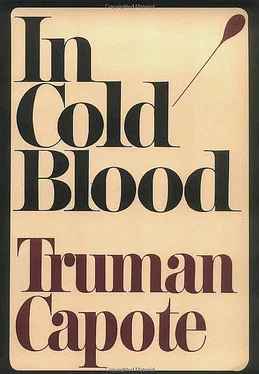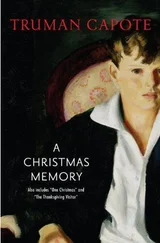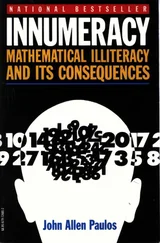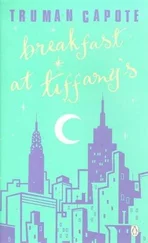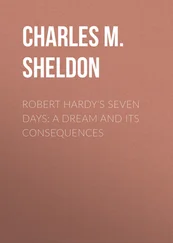Opposite the picture of Jimmy and his wife was a photograph of Perry in uniform. It had been clipped from a newspaper, and was accompanied by a paragraph of text: “Headquarters, United States Army, Alaska. Pvt. Perry E. Smith, 23, first Army Korean combat veteran to return to the Anchorage, Alaska, area, greeted by Captain Mason, Public Information Officer, upon arrival at Elmendorf Air Force Base. Smith served 15 months with the 24th Division as a combat engineer. His trip from Seattle to Anchorage was a gift from Pacific Northern Airlines. Miss Lynn Marquis, airline hostess, smiles approval at welcome. (Official U.S. Army Photo).” Captain Mason, with hand extended, is looking at Private Smith, but Private Smith is looking at the camera, in his expression Mrs. Johnson saw, or imagined she saw, not gratitude but arrogance, and, in place of pride, immense conceit, it wasn’t incredible that he had met a man on a bridge and thrown him off it. Of course he had. She had never doubted it.
She shut the album and switched on the television, bur it did not console her. Suppose he did come? The detectives had found her; why shouldn’t Perry? He need not expect her to help him, she wouldn’t even let him in. The front door was locked, but not the door to the garden. The garden was white with sea-fog; It might have been an assembly of spirits: Mama and Jimmy and Fern. When Mrs. Johnson bolted the door, she had in mind the dead as well as the living.
A cloudburst. Rain. Buckets of it. Dick ran. Perry ran too, but he could not run as fast; his legs were shorter, and he was lugging the suitcase. Dick reached shelter—a barn near the highway—long before him. On leaving Omaha, after a night spent in a Salvation Army dormitory, a truck driver had given them a ride across the Nebraska border into Iowa. The past several hours, however, had found them afoot. The rain came when they were sixteen miles north of an Iowa settlement called Tenville Junction.
The barn was dark.
“Dick?” Perry said.
“Over here,” Dick said. He was sprawled on a bed of hay.
Perry, drenched and shaking, dropped beside him. “I’m so cold,” he said, burrowing in the hay, “I’m so cold I wouldn’t give a damn if this caught fire and burned me alive.” He was hungry, too. Starved. Last night they had dined on bowls of Salvation Army soup, and today the only nourishment they’d had was some chocolate bars and chewing gum that Dick had stolen from a drugstore candy counter. “Any more Hershey?” Perry asked.
No, but there was still a pack of chewing gum. They divided it, then settled down to chewing it, each chomping on two and a half sticks of Doublemint, Dick’s favorite flavor (Perry preferred Juicy Fruit). Money was the problem. Their utter lack of it had led Dick to decide that their next move should be what Perry considered “a crazy-man stunt”—a return to Kansas City. When Dick had first urged the return, Perry said, “You ought to see a doctor.” Now, huddled together in the cold darkness, listening to the dark, cold rain, they resumed the argument, Perry once more listing the dangers of such a move, for surely by this time Dick was wanted for parole violation—“if nothing more.” But Dick was not to be dissuaded. Kansas City, he again insisted, was the one place he was certain he could successfully “hang a lot of hot paper. Hell, I know we’ve got to be careful. I know they’ve got a warrant out. Because of the paper we hung before. But we’ll move fast. One day—that’ll do it. If we grab enough, maybe we ought to try Florida. Spend Christmas in Miami—stay the winter if it looks good.” But Perry chewed his gum and shivered and sulked. Dick said, “What is it, honey? That other deal? Why the hell can’t you forget it? They never made any connection. They never will.”
Perry said, “You could be wrong. And if you are, it means The Corner.” Neither one had ever before referred to the ultimate penalty in the State of Kansas—the gallows, or death in The Corner, as the inmates of Kansas State Penitentiary have named the fad that houses the equipment required to hang a man.
Dick said, “The comedian. You kill me.” He struck a match, intending to smoke a cigarette, but something seen by the light of the flaring match brought him to his feet and carried him across the barn to a cow stall. A car was parked inside the stall, a black-and-white two-door 1956 Chevrolet. The key was in the ignition.
Dewey was determined to conceal from “the civilian population” any knowledge of a major break in the Clutter case—so determined that he decided to take into his confidence Garden City’s two professional town criers: Bill Brown, editor of the Garden City Telegram , and Rob Wells, manager of the local radio station. KlUL. In outlining the situation, Dewey emphasized his reasons for considering secrecy of the first importance: “Remember, there’s a possibility these men are innocent.”
It was a possibility too valid to dismiss. The informer, Floyd Wells, might easily have invented his story; such tale-telling was not infrequently undertaken by prisoners who hoped to win favor or attract official notice. But even if the man’s every word was gospel, Dewey and his colleagues had not yet unearthed one bit of solid supporting evidence—“courtroom evidence.” What had they discovered that could not be interpreted as plausible, though exceptional, coincidence? Just because Smith had traveled to Kansas to visit his friend Hickock, and just because Hickock possessed a gun of the caliber used to commit the crime, and just because the suspects had arranged a false alibi to account for their whereabouts the night of November 14, they were not necessarily mass murderers. “But we’re pretty sure this is it. We all think so. If we didn’t, we wouldn’t have set up a seventeen-state alarm, from Arkansas to Oregon. But keep in mind: It could be years before we catch them. They may have separated. Or left the country. There’s a chance they’ve gone to Alaska—not hard to get lost in Alaska. The longer they’re free, the less of a case we’ll have. Frankly, as matters stand, we don’t have much of a case anyhow. We could nab those sonsabitches tomorrow, and never be able to prove spit.”
Dewey did not exaggerate. Except for two sets of boot prints, one bearing a diamond pattern and the other a Cat’s Paw design, the slayers had left not a single clue. Since they seemed to take such care, they had undoubtedly got rid of the boots long ago. And the radio, too—assuming that it was they who had stolen it, which was something Dewey still hesitated to do, for it appeared to him “ludicrously inconsistent” with the magnitude of the crime and the manifest cunning of the criminals, and “inconceivable” that these men had entered a house expecting to find a money-filled safe, and then, not finding it, had thought it expedient to slaughter the family for perhaps a few dollars and a small portable radio. “Without a confession, we’ll never get a conviction,” he said. “That’s my opinion. And that’s why we can’t be too cautious. They think they’ve got away with it. Well, we don’t want them to know any different. The safer they feel, the sooner we’ll grab them.”
But secrets are an unusual commodity in a town the size of Garden City. Anyone visiting the sheriff’s office, three under-furnished, overcrowded rooms on the third floor of the county courthouse, could detect an odd, almost sinister atmosphere. The hurry-scurry, the angry hum of recent weeks had departed; a quivering stillness now permeated the premises. Mrs. Richardson, the office secretary and a very down-to-earth person, had acquired overnight a dainty lot of whispery, tiptoe mannerisms, and the men she served, the sheriff and his staff, Dewey and the imported team of K.B.I. agents, crept about conversing in hushed tones. It was as though, like huntsmen hiding in a forest, they were afraid that any abrupt sound or movement would warn away approaching beasts.
Читать дальше
